
General_English_Semester_1_New_LAST_LAST_doc
.pdf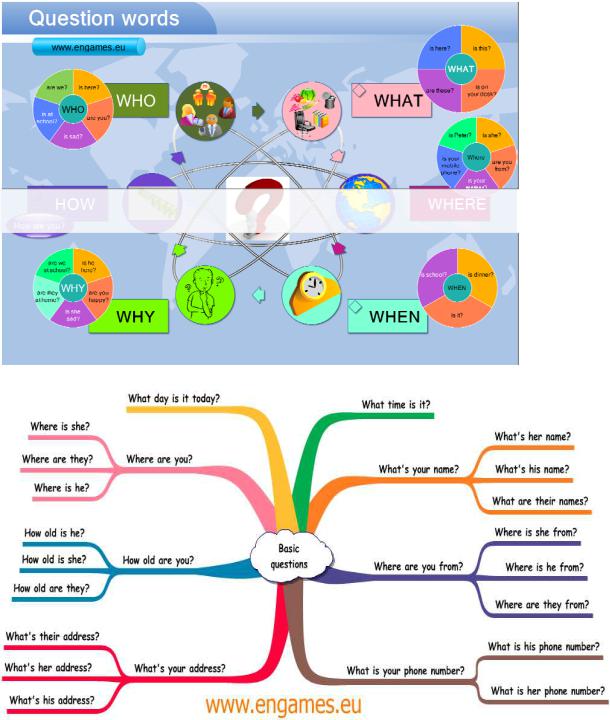
Team work.
Use the mind-maps below to learn more about your group mates
Self study. To learn more about greeting and introductions go to http://www.bbc.co.uk/worldservice/learningenglish/radio/specials/1142_greeting/index.shtml http://www.esolcourses.com/uk-english/beginners-course/unit-1/personal- information/introductions-greetings.html
Role play.
Student A. You are at a party. You don’t know anybody here. Ask the host to introduce you to the guests.
Student B. You are the host. You introduce student A to other guests.
13

Grammar spot
1. Study the table below. Go to Grammar Focus. Study the theory in detail. Find the examples of various parts of speech in the texts above.
Часть речи |
Функция |
Пример/слова |
Пример/предложение |
||
|
|
|
|
|
|
Noun (n)- |
Обозначает предмет, |
Language, greet- |
I’m a student at Chelya- |
||
существительное |
лицо или явление |
ing, introduction, |
binsk State University |
||
|
|
student, lecturer, |
|
|
|
|
|
faculty, Chelya- |
|
|
|
|
|
binsk |
|
|
|
Verb (v)- глагол |
Обозначает действие |
Be, have, study, |
I can speak several lan- |
||
|
или состояние |
introduce, greet, |
guages. I am rather good at |
||
|
|
speak |
English. |
||
|
|
|
The more languages you |
||
|
|
|
know, the more you are |
||
|
|
|
human. |
||
Adjective (adj) - |
обозначает качество |
Possible, interna- |
English is a language in- |
||
прилагательное |
предмета, лица или |
tional, helpful, |
ternational communica- |
||
|
явления |
ceaseless. |
tion. |
||
|
|
|
English is an excellent |
||
|
|
|
language to learn |
||
|
|
|
Reading is an important |
||
|
|
|
part of learning a new lan- |
||
|
|
|
guage |
||
Pronoun (pro) - |
Заменяют существи- |
I,we, he, she, |
If you want to build your |
||
местоимение |
тельные и другие |
you, what, this, |
vocabulary learn several |
||
|
части речи |
someone etc |
words a day. |
||
|
|
|
Some people have difficul- |
||
|
|
|
ties in reading , other in |
||
|
|
|
listening and comprehen- |
||
|
|
|
sion |
||
Adverb –(adv) - |
Обозначает качество |
Often, seldom, |
You can learn a language |
||
наречие |
действия |
quickly, well, |
quickly. Read and speak |
||
|
|
successfully |
in English regularly |
||
Numeral (num) - |
Обозначает количе- |
Two, twelve, |
Many people speak three |
||
числительное – |
ство |
twenty, hundred, |
or more languages quite |
||
|
|
the second |
fluently. |
||
Conjunction |
Служебная часть ре- |
and, but, or, |
Watch, listen, read and |
||
(conj)- союз |
чи, соединят слова и |
therefore, then, |
write in your chosen lan- |
||
|
предложения |
that |
guage. |
||
Article -артикль |
Служебная часть ре- |
a/an, the |
A student who works hard |
||
– |
чи, определитель |
|
can achieve very much. |
||
|
существительного |
|
|
|
|
Preposition (prep) |
Служебная часть ре- |
in, on, at, near, |
Learn a few greeting |
||
-предлог. |
чи, устанавливают |
by, before |
words in the language be- |
||
|
связи между словами |
|
|
|
learn the alphabet |
|
|
fore you |
|||
|
(членами предложе- |
|
|
|
|
14
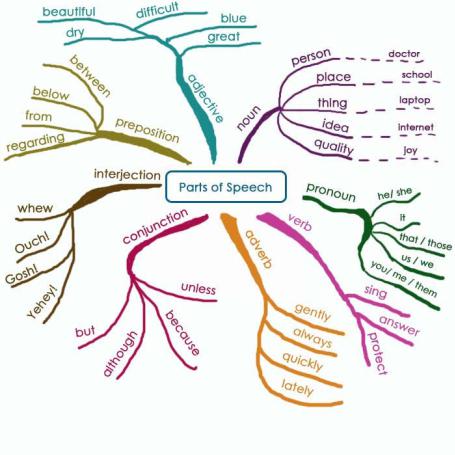
|
ния) |
|
|
Междометие – |
Служит для выраже- |
ah, wow, oops, |
Well done! |
Interjection (inter) |
ния эмоций, но прямо |
hey |
|
|
их не называет. |
|
|
2. Study the mind map. Add your own examples.
3.Go to Grammar Focus. Study basic tense forms in Active Voice. You may also visit http://www.ego4u.com/en/cram-up/grammar, http://www.study.ru/support/handbook/verb2.html
4.Learn more at http://www.grammar-quizzes.com/prestensum.html
5.You may watch a video about the English tenses at http://video.about.com/esl/Learn-ESL- -What-Are-the-Tenses-in-English-.htm
15
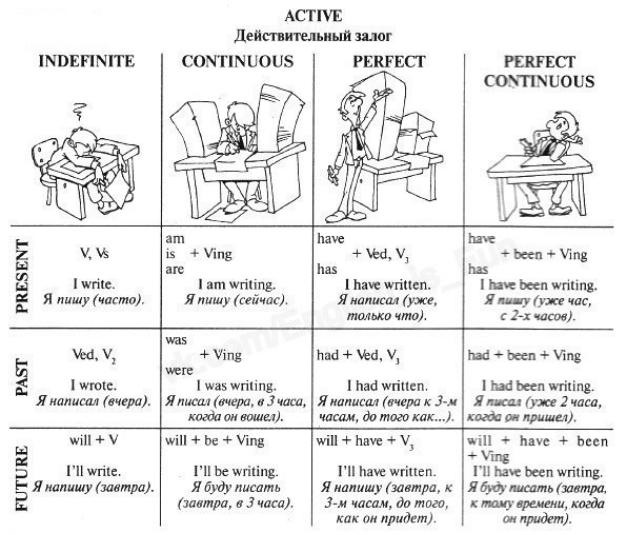
Grammar spot
1.Find examples of present, past, and future tenses in the texts above.
2.Which tenses are the two verb forms in these sentences?
What is the difference between them?
He lives with his parents.
She’s living with an English family for a month.
3.Choose the correct verb form.
1)Maria comes / is coming from Chile.
2)She speaks / is speaking Spanish and English.
3)Today Tom wears / is wearing jeans and T-shirt.
4)Are you liking / Do you like black coffee?
5)Last year she went / goes on holiday to Florida.
6)Next year she studies / is going to study at university.
Writing
Write a paragraph about yourself. Use the texts to help you.
Go to http://www.wikihow.com/Find-a-Penpal. Study how to find a pen pal. Make your profile.
Project work
Surf the Internet to find out how people greet each other in different cultures. Make up presentations.
16

Unit 2. Family
2.1 Patterns of Family Life
“All happy families resemble one another: every unhappy family is its own fashion.” (Leo Tolstoy)
Lead-in
What is a family? What associations do you have?
Paraphrase the quotation by Leo Tolstoy. Do you agree with it? Discuss, give reasons.
What is an ideal family as you see it?
Do you agree that the word family stands for:
F—Forget
A—About
M—Me
I—-I
L—Love
Y-You
(http://learning.blogs.nytimes.com/2011/02/24/how-do-you-define-family/#comment-145036)
Vocabulary
1. Families are divided into several types. Match the pictures with 1-3 with the phrases in the box:
a) nuclear family b) extended family c) single-parent family
1) |
2) |
17
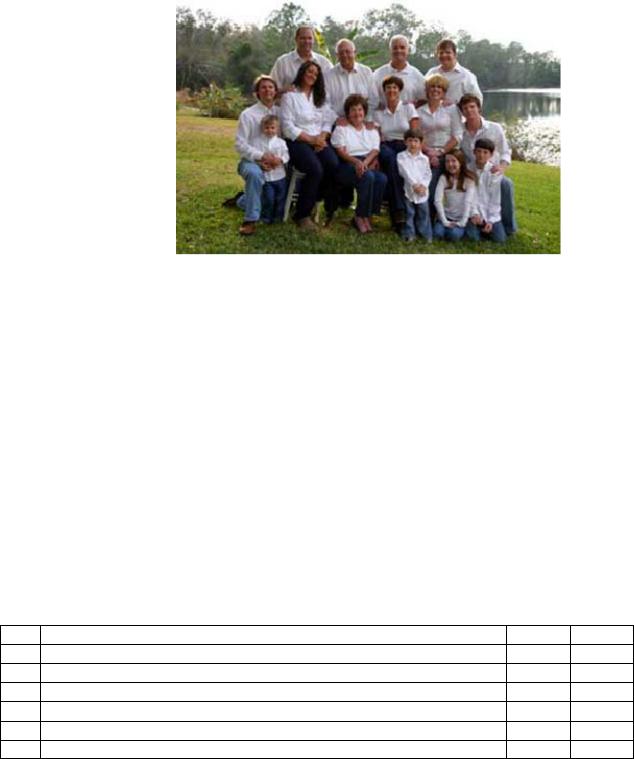
3)
Listening and reading (from Upload 3, Student’s Book by Virginia Evans & Jenny Dooley)
1.Listen to the dialogue. What is about?
Sue: Hi, Jane! What are you doing?
Jane: Hi, Sue. I’m looking through this album of old family photos my mum just sent me. Some of them really bring back memories.
Sue: That’s interesting! Can I have a look?
Jane: Of course. Let’s see if you can recognize me in this photo! My mum took it when I was about eight, I think. Now, which one is me?
Sue: I think, this is you, in the middle. Is that your gradma behind you?
Jane: You ‘re right and that’s my granddad, standing behind her. My parents are on the left. The girl in front of my mum is my sister, Lisa. The ones on the right are my mum’s twin sister, her husband and my cousin, Billy. He’s so funny. We all lived in the small town.
Sue: Well, you all look happy. Anyway, I’ll look at the rest later. I have a lecture now. Jane: Okay, see you.
2.Read the dialogue and decide whether the statements are T(true) or F(false).
|
T |
F |
1 |
Jane is looking at some photographs. |
|
2 |
The photo shows Jane as a child. |
|
3 |
Jane has two sisters. |
|
4 |
Jane’s mum has a brother. |
|
5 |
Sue lived on a farm as a child |
|
6 |
Jane is going to a lecture |
|
Reading
Before reading the text try to answer the following questions.
What is the difference between a modern family and the family of the past?
What types of modern family do you know? Which of them do you prefer/accept/approve?
1.Read the following statements and say if you agree or disagree with them.
Family is often the source of our problems and anxieties.
There are two general types of family: the nuclear family and the extended family.
18
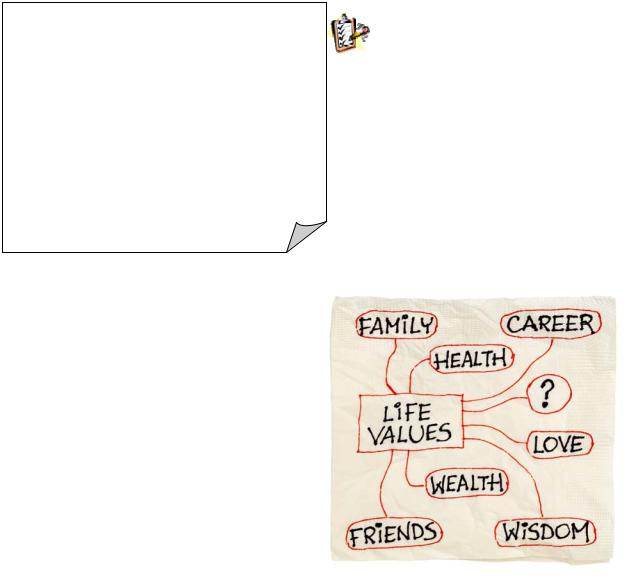
The family unit is in crisis now and traditional family life is a thing of the past.
Other types of family (e.g. single parent household, homosexual families, etc.) are as good as traditional (nuclear family).
2.Skim the text and check and make sure that you have guessed right.
Here are four different kinds of reading.
Skimming - running the eyes over quickly, Improve your study skills to get the gist
Scanning - looking for a particular piece of information
Extensive reading - longer texts for pleasure and needing global understanding
Intensive reading - shorter texts, extracting specific information, accurate reading for detail.( http://www.learningtolearn.group.shef.ac.uk
/read/read difkind task.html
There are many different views on family life. Some people could not do without the support and love of their families. Others say it is the
source of most of our problems and anxieties. Whatever the truth is, the family is definitely a powerful symbol. Turn to the television or open a magazine and you will see advertisements featuring happy, balanced families. Politicians often try to win votes by standing for “family values”: respect for parental authority, stability in marriage, chastity and care for the elderly.
Sociologists divide families into two general types: the nuclear family and the extended family, which may include three or more generations living together. In industrialized countries, and increasingly in the large cities of developing countries, the nuclear family is regarded as normal. Most people think of it as consist-
ing of two parents and two children. In fact, the number of households containing a nuclear family is shrinking year by year.
There are people who say that the family unit in most countries is in the crisis and that traditional family life is a thing of the past. This is of great concern to those who think a healthy society is dependent upon a stable family life. They see many indications that the family is in decline, in such things as the acceptance of sex before marriage, the increased number of one-parent families, the current high divorce rate and what they see as a lack of discipline within the family.
There is a definition of a “normal family”. Broadly speaking, the family is a group of people related by blood or law, living together or associating with one another for a common purpose. That purpose is usually to provide shelter and food, and to bring up children. The nature of the family keeps changing; there are a number of types of family that exists in a society at any one time.
3.Read the text again and answer the following questions:
1)What is the most general view on family life?
19

2)How do politicians use family values in their campaigns?
3)What is the extended family?
4)What are the indications that family life is in decline?
5)What is a ‘normal’ family?
Improve your study skills Developing reading strategies
Developing reading strategies
Before you read a text, you should be aware of which type of reading you are going to do. You will have to decide what your purpose is when reading a certain text. Becoming aware of this fact will help you to both focus on the important points and reach your goal.
SUGGESTIONS FOR IMPROVING YOUR READING SKILLS
Make it a habit to read texts in the foreign language. You may start with children's stories and move on to newspaper articles, magazines and books for adults.
Choose books, newspapers and magazines according to your personal interests and needs.
Buy a bilingual book or buy the same book in your native language and in the foreign language. When reading, compare the books when there is something that you don't understand.
Most of the time it is not necessary to understand every single word when reading a text. So don‘t panic if there are a few words you don‘t know. You may try to guess their meaning from the context.
If there are words that you don't know but you think are important, look them up in a dictionary and write them down. Study them again after reading.
If your reading purpose is to find out specific information, think about some key words first, then scan the text to find these key words. Underline important words and phrases. You may also take notes.
If your purpose is to generally understand the text, underline important phrases in each paragraph and write down the most important things.
Vocabulary practice
1. Give the English equivalents to the following words and phrases.
Поддержка и любовь, гармоничная семья, семейные ценности, родительская власть, стабильная брак, целомудрие, забота о престарелых, нуклеарная семья, расширенная семья, поколение, члены семьи/домочадцы, здоровое общество, стабильная семейная жизнь, упадок, неполная семья, высокий уровень разводов, два основных типа семьи, реклама, недостаток дисциплины, воспитывать детей, кровь.
2. Make up word combinations and use them in sentences or situations of your own.
1) |
single |
a) |
marriage |
2) |
working |
b) |
children |
3) |
the only |
c) |
child |
4) |
to spoil |
d) |
parents |
5) |
to bring up |
e) |
a child |
6) |
to run |
f) |
gap |
7) |
to get |
g) |
values |
8) |
generation |
h) |
family life |
9) |
family |
i) |
family |
20

10) |
nuclear |
j) |
rate |
11) |
stable |
k) |
divorce |
12) divorce |
l) |
mother |
|
3.Explain in English by matching A and B parts.
A |
B |
1)nuclear family |
a) the adults have divorced and remarried, bringing |
|
children from other unions together to form a new |
|
nuclear family |
2)immediate family |
b) a family which only has one parent (because the |
|
parents are divorced, or because one of the par- |
|
ents has died): |
3)step family |
c) parents and their children living in the same resi- |
|
dence or sharing the closest bonds |
4)adopted family |
d) includes all relatives ( grandparents, aunts, uncles, |
|
and cousins) living together and sharing daily |
|
household duties |
5)single-parent / one-parent family |
e) your closest relative |
6)foster family |
f) two parents may adopt a child to whom they share |
|
no blood relationship, or one parent may adopt |
|
the child of the other parent. |
7)extended family |
g) one or more adult parent who serves as a tempo- |
|
rary guardian for one or more children to whom |
|
they may or may not be biologically related. |
4. Write out all words and word combinations related to family. Add them to your topical vocabulary. Study the examples.
family gathering = a meeting / celebration of family members: "There's a small family gathering next week."
family resemblance = where members of the family look / act similar: "You can see a distinct family resemblance between the father and the son."
to start a family = to start having children: "They want to wait a couple of years before starting a family."
to run in the family = a characteristic that is common among family members: "Baldness runs in his family."
to bring up / raise a family = to have and look after children: "It's difficult to raise a family on one income."
a family car = a car big enough to transport a family: "The Volvo Estate is a popular family car."
family-size = large quantity item: "We need to buy family-size packets of biscuits!"
family-friendly = a policy that favours families: "This hotel is family-friendly."
family doctor = a doctor who looks after general medical needs: "There are a number of good family doctors in this area."
family man = a man who prefers to spend his time with his family: "John is a family man."
family values = traditional ideas about what a family should be: "Some political parties often emphasise family values and the importance of marriage."
family name = surname: "What's your family name?"
( From http://www.english-at-home.com/vocabulary/talking-about-your-family/
21
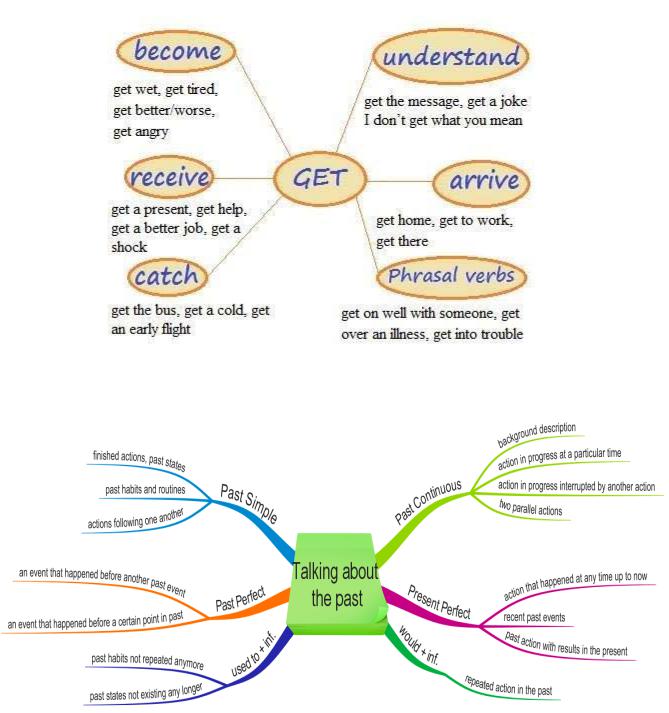
Grammar spot
1. Phrasal verbs. Consult the dictionary. Look up the as many word combinations as you can with the verb ‘ to get’.
2.Make up 10 sentences. Exchange with you groupmates.
3.Talking about the past. Go to http://www.grammar-quizzes.com/pastsum.html. Study the mind map. Make up sentences.
4. Put the verbs in brackets into the appropriate verb form.
Nicholas Romanov 1)_______(be born) on 19 May 1868 to Tsar Alexander III and his wife, Danish princess Marie Fedorovna. He 2)_______(be) the eldest of six children and 3)_______(become) Tsar Nicholas II in 1894 when his father 4)________(die) at the age of 49 of kidney failure.
Nicholas, who 5)________(be)s a gentle man, 6)__________ (be trained) trained to be the Tsar and 7)__________(be unprepared) for the role. At the time of his father's death, he 8)________(be
22
